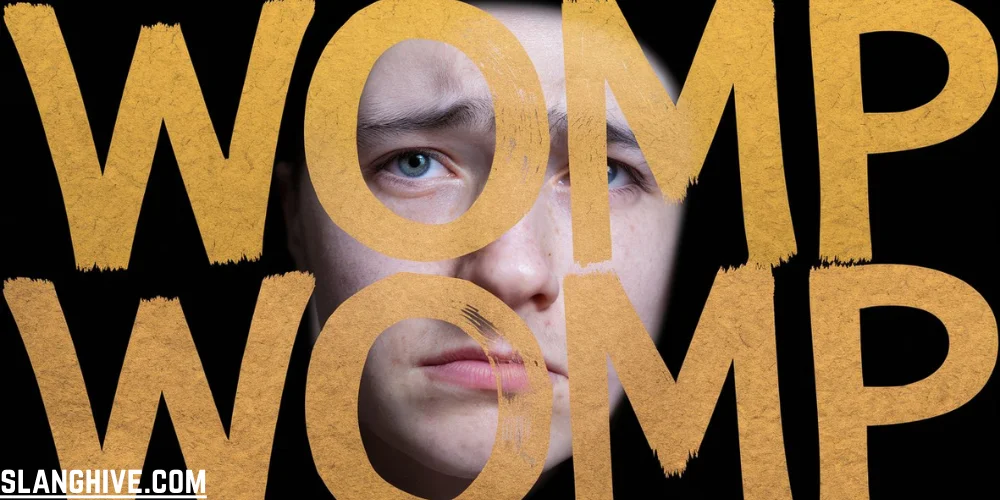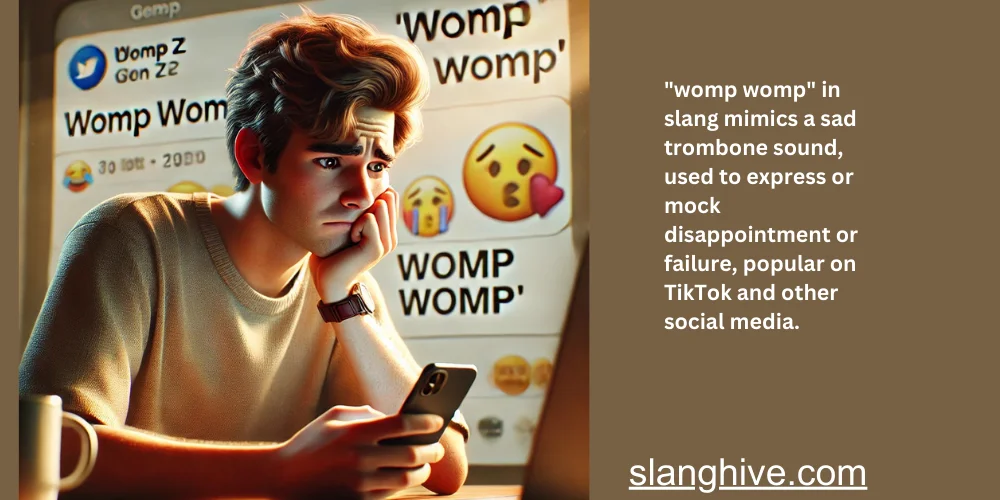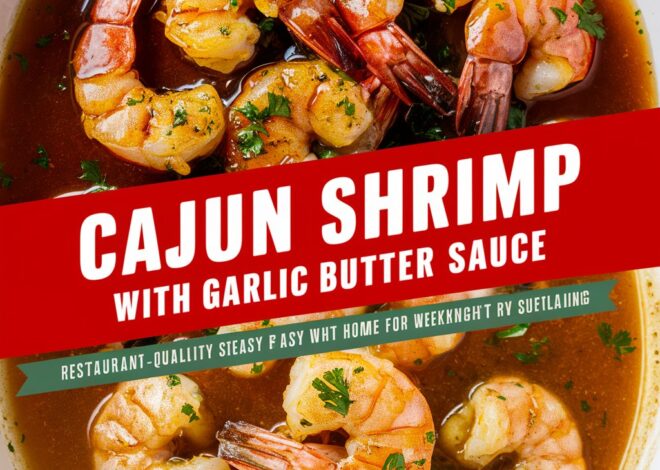
What Does “Womp Womp” Mean in Slang? Unpacking the Viral Expression
If you’ve spent any time on TikTok or social media, you’ve probably come across the phrase “womp womp.” But, What Does “Womp Womp” Mean in Slang?
“womp womp” mimics the classic sad trombone sound, often used to highlight disappointment, failure, or an anticlimactic moment.
Whether it’s used playfully, sarcastically, or even controversially, the phrase carries different tones depending on the context.
Rooted in old-school vaudeville and game shows, “womp womp” has evolved into a meme-driven expression in today’s digital culture. While it’s mostly used for humor, some instances have sparked debate, especially when aimed at sensitive topics.
This article explores its origins, meanings, and how it became a staple in modern communication.
Key Points
- Research suggests: “womp womp” in slang mimics a sad trombone sound, used to express or mock disappointment or failure, popular on TikTok and other social media.
- It seems likely that “womp womp” can be used both lightheartedly and sarcastically, depending on context, with some controversy when used in sensitive situations.
- The evidence leans toward “womp womp” originating from vaudeville and game shows, becoming a meme in digital culture, reflecting humor and generational communication.
Womp Womp in Slang Meaning
In slang, “womp womp” is used to express or mock disappointment or failure in a lighthearted or sarcastic way. It can be used to comment on one’s own misfortunes, like saying “womp womp” after spilling coffee, or to tease others about minor complaints, such as responding “womp womp” when a friend can’t find their pen.
In Literal Meaning
The term “womp womp” is an onomatopoeic expression that mimics the sound of a trombone playing a descending note, often used to indicate failure or disappointment in comedic contexts.
In Cultural Significance
“Womp womp” has become a significant part of internet culture, particularly among younger generations who use it in memes and social media posts. Its usage has spread widely, even entering political discourse, and is often used to comment on or react to unfortunate situations humorously. However, its use in specific contexts, like political commentary, can be seen as insensitive or mocking, leading to potential controversy.
Comprehensive Analysis of “Womp Womp” in Slang
This note provides a detailed exploration of the slang term “womp womp,” its literal and cultural meanings, and alternatives across different contexts, expanding on the key points for a thorough understanding. The analysis is informed by recent online sources, reflecting usage as of 2025.
The Slang Meaning of “Womp Womp”
In slang, “womp womp” is used to express or mock disappointment or failure in a lighthearted or sarcastic way. It can be used in two main ways:
- Expressing One’s Own Disappointment: This is often self-deprecating, such as saying “womp womp” after a minor mishap, like dropping ice cream. An example is, “I missed the bus by seconds—womp womp,” indicating a recognition of the setback without dwelling on it.
- Mocking Someone Else’s Complaint: It’s commonly used to tease others about minor complaints or failures, such as responding “womp womp” when a friend complains about spilling coffee. This usage is playful, often said with a tone of irony, like, “You lost your pen? Womp womp, better luck next time.”
The term is mainly used sarcastically, especially in video comments on TikTok when the original poster complains about something silly or unimportant. For instance, a TikTok trend involves posting about moving on from a toxic friend with the caption “womp womp,” implying “too bad, so sad.”
Literal Meaning of “Womp Womp”
The term “womp womp” is an onomatopoeic expression that mimics the sound of a trombone playing a descending note, often used to indicate failure or disappointment. This sound effect has its roots in vaudeville shows and was popularized in television game shows to mock contestants’ failures. The sound is typically described as a “sad trombone,” with the first “womp” being a higher frequency sound than the second, creating a descending, mournful tone.
The origin of the sound is widely rumored to have started with vaudeville shows popular in North America between the 1880s and 1930s, where performers used exaggerated sound effects to punctuate jokes. This historical context highlights its evolution from live performances to broadcast media, becoming a staple in comedic timing.
Cultural Significance of “Womp Womp”
“Womp womp” holds cultural significance within internet and Gen Z communities, reflecting humor and generational communication. Key aspects include:

- Origin and Evolution: The term likely originated from the “sad trombone” sound effect used in vaudeville and game shows, gaining popularity in the mid-2000s as internet culture exploded. A notable moment was in May 2010 when YouTuber Josh Streeter uploaded a sound clip of the sad trombone, gaining over 1.5 million views.
- Digital Usage: It’s prevalent on platforms like TikTok, with trends like “I Hope They Play Fein” using “womp womp” to express ironic disappointment. It’s also used across Snapchat, WhatsApp, Instagram, and X, reflecting its broad digital reach.
- Community and Controversy: The term reached new heights in 2018 when former political commentator Corey Lewandowski used it dismissively during a Fox News segment about a sensitive topic involving children at the border, saying “womp womp” to mock a story about a 10-year-old girl with Down Syndrome. This incident sparked backlash, highlighting the potential for criticism when slang is used in sensitive contexts.
This cultural shift reflects how slang evolves in digital communities, often drawing from historical comedic conventions to create social commentary, but also highlighting tensions around its use in serious discussions.
Alternatives to “Womp Womp” in Different Contexts
Given the varied meanings of “womp womp,” especially its lighthearted and mocking tones, alternatives depend on the context and desired tone.
| Context | Alternative | Description | Example Usage |
| Polite | That’s unfortunate | Respectful, indicating sympathy, subtle. | “That’s unfortunate; I hope things improve.” |
| Polite | I’m sorry to hear that | Polite, expressing empathy, neutral tone. | “I’m sorry to hear that; better luck next time.” |
| Polite | That didn’t turn out well | Gentle way to acknowledge disappointment, courteous. | “That didn’t turn out well; let’s find a solution.” |
| Professional | This isn’t ideal | Formal, clear, suitable for work settings. | “This isn’t ideal; we need to reassess our strategy.” |
| Professional | We’ll need to adjust | Direct, emphasizing need for action, professional. | “We’ll need to adjust; this outcome wasn’t expected.” |
| Professional | There’s room for growth | Formal, indicating potential for improvement. | “There’s room for growth here; let’s learn from this.” |
| Casual | Bummer | Informal, playful, for friends or family. | “Bummer, you missed the bus.” |
| Casual | That sucks | Straightforward, casual, for informal chats. | “That sucks; your coffee spilled.” |
| Casual | Oh well, such is life | Light-hearted, for peers, brushing off minor issues. | “Oh well, such is life; I lost my pen.” |
| Polite | Aww, poor you | Respectful, teasing lightly, for minor complaints. | “Aww, poor you; your Wi-Fi is slow.” |
| Polite | That’s a real shame | Polite, with slight sarcasm, for trivial issues. | “That’s a real shame; they ran out of your favorite flavor.” |
| Casual | First-world problems | Playful, mocking minor complaints, informal. | “First-world problems; your nail broke.” |
| Casual | Cry me a river | Sarcastic, for overblown reactions, casual. | “Cry me a river; you have to wait for the bus.” |
| Casual | Such a hardship | Ironic, for trivial complaints, lighthearted. | “Such a hardship; your toast burned.” |
These alternatives ensure respectful and appropriate communication, avoiding potential offense or misunderstanding associated with “womp womp,” especially in professional or sensitive settings.
Texting Examples for User-Friendly Communication
- “Friend: I can’t find my favorite pen. You: womp womp, maybe it’s time to buy a new one.”
- “You: I didn’t get the job I applied for. Womp womp.”
- “Friend: My ice cream melted. You: womp womp, guess you’ll have to get another one.”
- “Colleague: The project didn’t meet expectations. You: That’s not ideal. Let’s see how we can improve.”
- “Acquaintance: I failed my exam. You: I’m sorry to hear that. Better luck next time.”
- “Friend: I have to wait 5 minutes for the bus. “You: First-world problems, huh?” ?”
- “You: I burned my toast again. Womp womp.”
- “Friend: My phone battery died in the middle of a call. You: That’s inconvenient. Hope you got to call back.”
- “Manager: Sales are down this quarter. You: This isn’t the result we wanted. Let’s strategize for next quarter.”
- “You: The Wi-Fi is slow today. Womp womp.”
- “Friend: They didn’t have my favorite flavor at the store. You: Oh, the horror!”
- “Friend: I’m stuck in traffic. You: That stinks. Hope you get home soon.”
- “Team member: The client rejected our proposal. You: That’s disappointing. Let’s see what we can do to address their concerns.”
- “You: I missed the bus by seconds. Womp womp.”
- “Friend: My nail broke! You: Such a tragedy! Whatever will you do?”
Conclusion
This analysis shows “womp womp” as a dynamic slang term, rooted in digital culture, with clear alternatives for various contexts. Understanding these nuances enhances communication, whether in polite, professional, or casual settings, reflecting the evolving nature of language in 2025.


